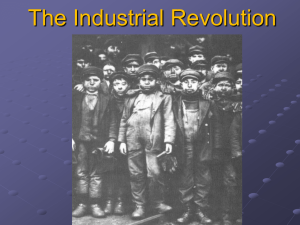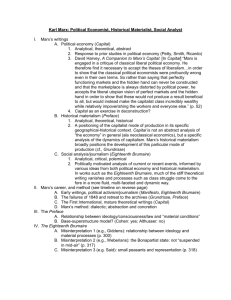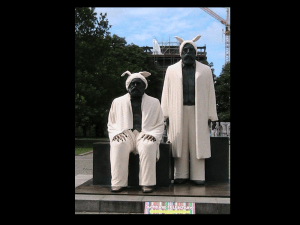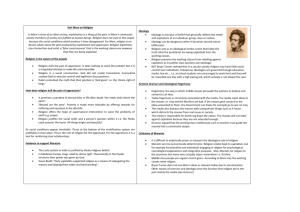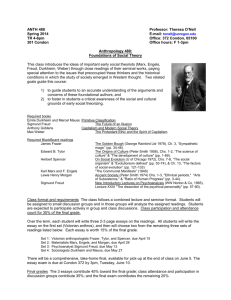Men , Ideas and Society - The World Socialist Party (India)
advertisement
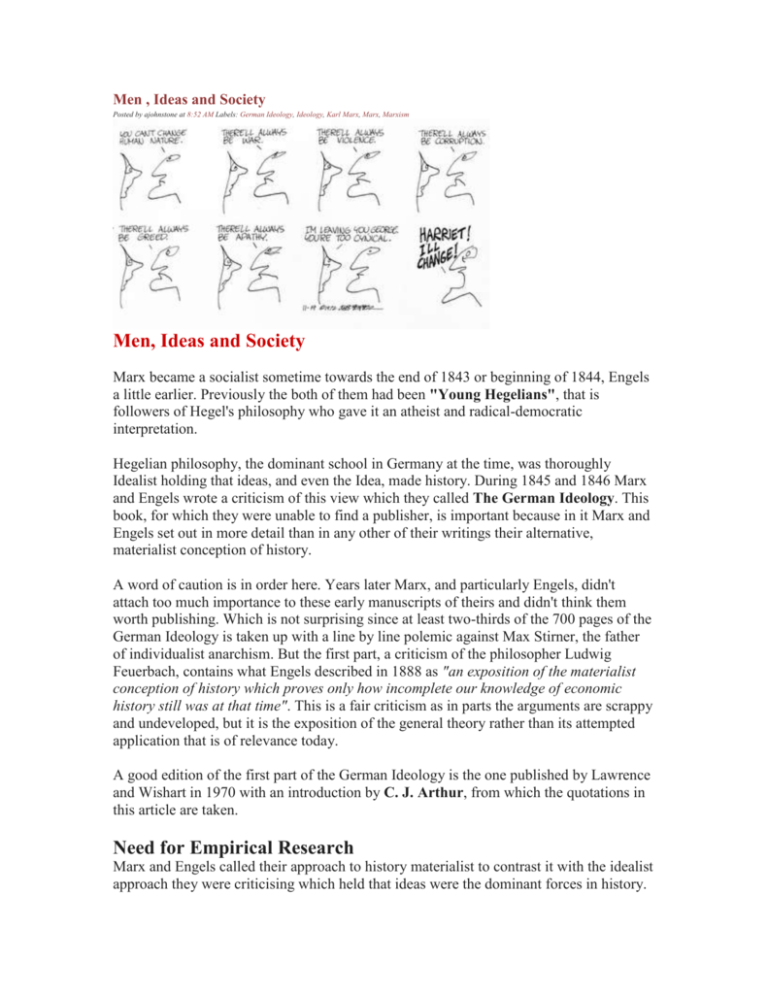
Men , Ideas and Society Posted by ajohnstone at 8:52 AM Labels: German Ideology, Ideology, Karl Marx, Marx, Marxism Men, Ideas and Society Marx became a socialist sometime towards the end of 1843 or beginning of 1844, Engels a little earlier. Previously the both of them had been "Young Hegelians", that is followers of Hegel's philosophy who gave it an atheist and radical-democratic interpretation. Hegelian philosophy, the dominant school in Germany at the time, was thoroughly Idealist holding that ideas, and even the Idea, made history. During 1845 and 1846 Marx and Engels wrote a criticism of this view which they called The German Ideology. This book, for which they were unable to find a publisher, is important because in it Marx and Engels set out in more detail than in any other of their writings their alternative, materialist conception of history. A word of caution is in order here. Years later Marx, and particularly Engels, didn't attach too much importance to these early manuscripts of theirs and didn't think them worth publishing. Which is not surprising since at least two-thirds of the 700 pages of the German Ideology is taken up with a line by line polemic against Max Stirner, the father of individualist anarchism. But the first part, a criticism of the philosopher Ludwig Feuerbach, contains what Engels described in 1888 as "an exposition of the materialist conception of history which proves only how incomplete our knowledge of economic history still was at that time". This is a fair criticism as in parts the arguments are scrappy and undeveloped, but it is the exposition of the general theory rather than its attempted application that is of relevance today. A good edition of the first part of the German Ideology is the one published by Lawrence and Wishart in 1970 with an introduction by C. J. Arthur, from which the quotations in this article are taken. Need for Empirical Research Marx and Engels called their approach to history materialist to contrast it with the idealist approach they were criticising which held that ideas were the dominant forces in history. On the contrary, said Marx and Engels, ideas arise from material social conditions so it is with the study of these conditions that all historical research must begin: “The premises from which we begin are not arbitrary ones, not dogmas, but real premises from which abstraction can only be made in the imagination. They are the real individuals, their activity and the material conditions under which they live, both those which they find already existing and those produced by their activity. These premises can thus be verified in a purely empirical way” (p.42). and, “The fact is, therefore that definite individuals who are productively active in a definite way enter into these definite social and political relations. Empirical observation must in each separate instance bring out empirically, and without any mystification and speculation, the connection of the social and political structure with production” (p.46). That the materialist conception of history insists on scientifically-conducted empirical observation of what real men actually do has sometimes been forgotten by many who consider themselves Marxist. They have mistakenly treated the materialist conception of history as a short-cut to understanding history without needing to study the results of historical research. The German Ideology is not itself a work of original research, but is rather a preliminary elaboration of some general theoretical conclusions suggested by the research of others. Man Makes Himself There is no such thing, say Marx and Engels, as abstract human nature, what the German philosophers they were criticizing called the "essence of Man". Their criticism of Feuerbach is neatly summed up as "he says 'Man' instead of 'real historical man'." They went on later: “because he still remains in the realm of theory and conceives of men not in their given social connection, not under their existing conditions of life, which have made them what they are, he never arrives at the really existing active men, but stops at the abstraction 'man' ” (p.64). So, to find out what "human nature" might be we must study what men do, i.e. human behaviour. Such a study soon discloses that there is no such thing as a fixed human nature in the sense of a fixed human behaviour pattern, but rather a great variety of behaviour patterns depending on differing social environments. Human behaviour, in other words, is socially-determined and changes along with the changing social environment. But Marx and Engels do not stop here, leaving men the passive products of their environment. They point out how men, unlike other animals, play an active part in shaping their environment. Indeed, it is precisely this that distinguishes man from the other animals: “Men can be distinguished from animals by consciousness, by religion or anything else you like. They themselves begin to distinguish themselves from animals as soon as they begin to produce their means of subsistence, a step which is conditioned by their physical organisation. By producing their means of subsistence men are indirectly producing their actual material life.” They go on: “The way in which men produce their means of subsistence depends first of all on the nature of the actual means of subsistence they find in existence and have to reproduce. This mode of production must not be considered simply as being the production of the physical existence of the individuals. Rather it is a definite form of activity of these individuals, a definite form of expressing their life, a definite mode of life on their part. As individuals express their life, so they are. What they are, therefore, coincides with their production, both with what they produce and with how they produce. The nature of individuals thus depends on the material conditions determining their production” (p.42). Very crudely, man is what he does. Men in effect make themselves in that their behaviour is determined by conditions which they themselves continually create and recreate. These conditions have to be taken as given, as part of the environment, by those born into them so that, at any stage in history, "there is found a definite material result"; namely: “a sum of productive forces, an historically created relation of individuals to nature and to one another, which is handed down to each generation from its predecessor; a mass of productive forces, capital funds and conditions, which, on the one hand, is indeed modified by the new generation, but also on the other prescribes for it its conditions of life and gives it a definite development, a special character. It shows that circumstances make men just as much as men make circumstances. This sum of productive forces, capital funds and social forms of intercourse, which every individual and generation finds in existence as something given, is the real basis of what the philosophers have conceived as 'substance' and 'essence of man'.” (p.59) Men are continually modifying, within certain limits, their behaviour. Or, to put it another way, their "nature" is continually changing. What is remarkable about this view is the time it was formulated: 1846. For it anticipated by nearly a century the theories of modern anthropology which see man as a "culturebearing animal", culture being the technical name for the artificial part of the social environment — instruments of production, behaviour-patterns, ideas, what Marx and Engels described as a "sum of productive forces, capital funds and social forms of intercourse" — handed down from generation to generation by non-biological means. According to modern anthropology all human behaviour is learned and culturallydetermined, but culture is itself a human creation so that it is quite legitimate to say that man makes himself. Which was precisely Marx and Engels' point and the basis of their materialist conception of history. Where Marx and Engels would differ from most modern anthropologists is in attributing the key role in determining the patterns of human behaviour to one particular part of culture, namely, the mode of production. Social Nature of Mind German idealist philosophy made ideas the driving forces of history. Marx and Engels did not deny that the real men who made history were conscious beings who had ideas about what they were doing; their point was that these ideas did not come from nowhere and were not arbitrary. Ideas, they said, arose from material social conditions so that men's ideas reflect their material conditions of life, their activity in society. Consciousness in the abstract did not exist: "Consciousness can never be anything else than conscious existence, and the existence of men is their actual life process" and "life is not determined by consciousness, but consciousness by life". The theory advanced here is not a theory of the physiology of perception and thinking (which Marx and Engels knew they were not qualified to formulate) so that talk of ideas "reflecting" social processes must not be misunderstood as a theory that the brain is a kind of camera photographing the world. It is a theory of the social origin of ideas. Though Marx and Engels did go further than saying merely that the particular ideas men held at any particular time depended on the particular society they were living in. They also argued that "consciousness" (in the sense of the ability to think abstractly, to consider and plan future behaviour, to be aware of your own existence as a separate organism) as an empirical phenomenon was a social product: “Language is as old as consciousness, language is practical consciousness that exists also for other men, and for that reason alone it really exists for me personally as well; language, like consciousness, only arises from the need, the necessity of intercourse with other men . . . Consciousness is, therefore, from the very beginning a social product, and remains so as long as men exist at all” (p.51). Language is obviously a social product, the outcome of men living together in societies and communicating with each other for co-operative activity. Language is not the only method of communication, but it is a highly-developed and specialized one and one which alone makes abstract thought possible. Language can be defined as an organized system of meaningful symbols (words) standing for abstractions and mental constructs from the ever-changing world of reality. Other animals can only react to their immediately-sensed environment; they cannot abstract parts of it so as to consider, delay or plan their response. The only animal that can do this is man and it is through language that they do it (of course this presupposes also a development of the brain and nervous system that makes language and abstract thought possible). Since abstract thought — "consciousness" in the sense used here by Marx and Engels — is impossible without language, since in fact language and abstract thought are two aspects of the same thing, and since language is a social product, it follows that thinking, consciousness, mind are also social products. Once again this view is surprisingly modern, anticipating by over half a century its systematic elaboration by George Herbert Mead in his lectures at the University of Chicago (published in 1934, after his death, under the title Mind, Self and Society). It is a refutation not only of idealist theories which see mind as some mysterious intangible substance human beings are endowed with at or before birth, but also of crude materialist theories which seek to reduce thought to a purely biological, physical or chemical phenomenon. Thought of course does involve brain activity but there is more to it than that. Marx's theory of mind was materialist in that it explained "mind" in terms of material social conditions rather than in terms of some mysterious physical substance called "matter". Human beings are born with brains, but not minds. Men only acquire minds in and through society, the content of their minds reflecting their social life and experience. A man outside society, could he exist, would have a brain, but no mind. Which is why physical theories of mind are inadequate. More Too That human nature is variable and socially-conditioned and that mind is a social product are only two of the theories put forward in the German Ideology. Marx and Engels also sketch the emergence of capitalism out of feudalism (along the lines elaborated in the Communist Manifesto they wrote two years later) and set out the general relationship between the forces of production, the social system and ideology in more detail than in Marx's well-known 1859 Preface to the Critique of Political Economy. And there's some useful comment on the nature of socialism (then called communism) and on the need to capture political power to change society. All in all, Part One of the German Ideology is a very good introduction to the materialist conception of history and a key work of Socialist theory. (Socialist Standard, September 1973) SHARE | 1 COMMENTS: aberfoyle said... Brain and Mind two separate words similar to a car that has an engine, the engine being the brain and the fuel to propel the engine petrol the mind, and without one or other does not function. Scientists and Doctors say that in the early stages of life our brain is at it most active registering recording storing information sound smell taste feeling all that is basic in our beginning of life. So rapid is this development that is what is termed mind (memory) that they say that if a new born child has one eye covered at birth the other not the child will see, yet on removal of the cover the other eye will not. The eye is good no damage yet the part of the brain responsible in those short months has not been allowed to register to sight and never will. Yet our brain is changing all the time. If you enter a room have a conversation and leave, your brain will have changed for your mind has seen absorbed and collected information and in that altered. So your brain being the engine is only performing on what fuel information you consciously let your mind accept and store. And as Marx/Engels say is associated by your environment AND WHAT YOU CHOOSE TO ACCEPT. If science and scientist were asked what was the better the result or the ideas and theory leading to the result, I think they would agree the idea and theory for that process was more stimulating. And that takes us back to the grey area, is socialist theory a science. The accepted founding document by most socialist The Communist Manifesto, although dealing with production and ownership was also drafted on the past and present social living conditions of human existence, and like the ever developing theory of science it to is also a developing theory, and dealing with human nature in my opinion is a form of science.

